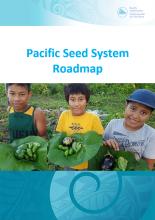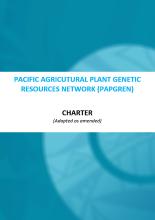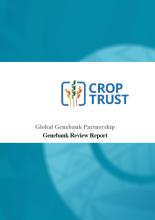The Centre for Pacific Crops and Trees (CePaCT) works to ensure efficient long-term conservation of a broad range of genetic diversity of key crops and tree species of the Pacific region, as well as promote underutilized crops. CePaCT is the Pacific’s main regional genebank and was established in 1998 by SPC as part of its long-term investment in sustainable food-secure Pacific. CePaCT is internationally recognized by the Global Crop Diversity Trust, the CGIAR Research Institutes and international networks as a focal point for plant genetic resources for food and agriculture in the region.
CePaCT engages with multiple stakeholders to establish a thriving seed system in the Pacific region that contributes to food and nutrition security and sustainable livelihoods.
As a state-of-the-art, trusted genetic resources service-provider, it provides four key services:
CePaCT works with its member countries through PAPGREN and the Forestry Sectors through the LRD Sustainable Forest Management and Landscapes work theme to identify important crops and trees species for conservation. The Centre uses, field, seed and in vitro (tissue culture) methodologies for the conservation of its crop and tree collections. Cryopreservation capacities are currently being established to further support the long-term conservation of it’s ‘hard-to-conserve’ crop and tree species such as coconuts.
CePaCT makes its crop and tree collections accessible to users in the Pacific as well as globally through appropriate material transfer Agreements. The Centre currently distributes tissue culture plantlets, seeds, DNA and leaf samples. It is also developing an online database, PacGRIS, that will facilitate future germplasm requests.
To support the safe exchange of crop and tree germplasm, CePaCT has established a germplasm health testing unit. This unit ensures that all CePaCT crops are pathogen tested to international standards and cleaned before they are made available for distribution. The germ health unit also carries out research on plant pathogen diagnostics and plans to provide diagnostic service to the Pacific.
CePaCT is developing the capacity for DNA fingerprinting using various techniques in collaboration with other international partners. It is currently genotyping sweet potato, taro and breadfruit. Coconut genotyping is also carried out to support the collection and development of a coconut collection. This work will inform effective conservation and utilization strategies of the CePaCT crop collections.
 Pacific Seed System Roadmap
Pacific Seed System Roadmap  PAPAGREN Charter Adopted
PAPAGREN Charter Adopted  CePaCT Review Report | 03.01.2024
CePaCT Review Report | 03.01.2024